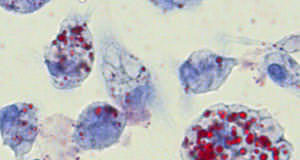Apple A Day Reduces Blood Levels Of Chemical Linked To Hardening...
Eating an apple a day might in fact help keep the cardiologist away, new research suggests. In a study of healthy, middle-aged adults, consumption of one apple a day for four weeks lowered by 40 percent blood levels of a substance linked to hardening of the arteries. Taking capsules containing polyphenols, a type of antioxidant found in apples, had a similar, but not as large, effect.
New Way Of Fighting High Cholesterol Upends Assumptions
Atherosclerosis -- the hardening of arteries that is a primary cause of cardiovascular disease and death -- has long been presumed to be the fateful consequence of complicated interactions between overabundant cholesterol and resulting inflammation in the heart and blood vessels.
Yogurt Consumption, Blood Pressure, and Incident Hypertension
Adding more yogurt to your diet without increasing the number of calories you eat may help lower your risk of high blood pressure, according to new research presented at the American Heart Association's High Blood Pressure Research 2012 Scientific Sessions.
Extreme Temperatures May Raise Risk Of Premature Cardiovascular Death
Extreme temperatures during heat waves and cold spells may increase the risk of premature cardiovascular disease (CVD) death, according to new research in Circulation: Cardiovascular Quality and Outcomes, an American Heart Association journal.
Cannabis Anti-Convulsant Shakes Up Epilepsy Treatment
The versatile cannabis plant may have a new use: it could be used to control epileptic seizures with fewer side effects than currently prescribed anti-convulsants. Ben Whalley at the University of Reading, UK, and colleagues worked with GW Pharmaceuticals in Wiltshire, UK, to investigate the anti-convulsant properties of cannabidivarin (CBDV), a little-studied chemical found in cannabis and some other plants.
Experts Recommend Screening Adults For Hypertriglyceridemia Every Five Years
The Endocrine Society today issued a Clinical Practice Guideline (CPG) for the diagnosis and treatment of hypertriglyceridemia. Triglycerides are a type of fat found in the blood and are associated with cardiovascular risk. The CPG, entitled "Evaluation and Treatment of Hypertriglyceridemia: An Endocrine Society Clinical Practice Guideline" appears in the September 2012 issue of the Journal of Clinical Endocrinology and Metabolism (JCEM), a publication of The Endocrine Society.
Egg Yolk Consumption Almost As Bad as Smoking When It Comes...
Newly published research led by Western's Dr. David Spence shows that eating egg yolks accelerates atherosclerosis in a manner similar to smoking cigarettes. Surveying more than 1200 patients, Spence found regular consumption of egg yolks is about two-thirds as bad as smoking when it comes to increased build-up of carotid plaque, a risk factor for stroke and heart attack. The research is published online in the journal Atherosclerosis.
Tai Chi Shown To Improve COPD Exercise Capacity
Tai Chi can be used as an effective form of exercise therapy for people with chronic obstructive pulmonary disease (COPD), according to new findings. The research, which was published online August 9, 2012 ahead of print in the European Respiratory Journal, suggests that this form of exercise can improve exercise capacity and quality of life in people with COPD and may be as beneficial as pulmonary rehabilitation.
Natural Antioxidant Can Protect Against Cardiovascular Disease
University of Minnesota Medical School researchers have collaborated with the School of Public Health and discovered an enzyme that, when found at high levels and alongside low levels of HDL (good cholesterol), can dramatically reduce the risk of cardiovascular disease.
Research Examines Major Bleeding Risk With Low-Dose Aspirin Use In Patients...
Among nearly 200,000 individuals, daily use of low-dose aspirin was associated with an increased risk of major gastrointestinal or cerebral bleeding, according to a study in the June 6 issue of JAMA. The authors also found that patients with diabetes had a high rate of major bleeding, irrespective of aspirin use.
Calorie-Restricted Diet Keeps Heart Young
People who restrict their caloric intake in an effort to live longer have hearts that function more like those in people who are 20 years younger. Researchers at Washington University School of Medicine in St. Louis have found that a key measure of the heart's ability to adapt to physical activity, stress, sleep and other factors that influence the rate at which the heart pumps blood, doesn't decline nearly as rapidly in people who have significantly restricted their caloric intake for an average of seven years.
21st Century Bloodletting Reduces Cardiovascular Risk
It seems that while the practice of bloodletting throughout history had little or no effect on most diseases, and the practice was abandoned in the 19th century, new research published in BioMed Central's open access journal BMC Medicine demonstrates that blood donation has real benefits for obese people with metabolic syndrome. Two sessions of bloodletting were enough to improve blood pressure and markers of cardiovascular disease.
















